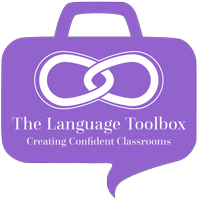
Home Sweet Home
School
Date
Language Program
St Kilda Park Primary School, Melbourne Australia
September 2016
Italian
According to The Oxford Dictionary, the definition of ‘home’ is ‘the place where one lives permanently.’
Can a place still be regarded as a ‘home,’ even if one does not live there? I think yes.
Reading on, definition No. 1.4 defines ‘home’ as being ‘a place where something flourishes.’ And so, what better word to use when describing a school! St Kilda Park Primary School (SKiPPS) was, and always will be, my home for many of my teaching years.
For me, this is where my love of teaching and learning began and where my passion for additional languages flourished. It is therefore fitting that the very first article for my new ‘Stella Schools’ series is based upon SKiPPS – “The school on the park.”
In many aspects, SKiPPS is a rather unique school. No uniforms; a ‘no homework’ policy; teachers and school leaders are addressed by their first names and the ‘Philosophy For Children’ is a core element of the SKiPPS curriculum for all students.
Set at the southern end of the much-adorned Albert Park in the über-cool Melbourne bayside suburb of St Kilda, SKiPPS is well-known to the diverse and eclectic community that surrounds it. The children here are bright and bubbly and display a deep-love of learning.
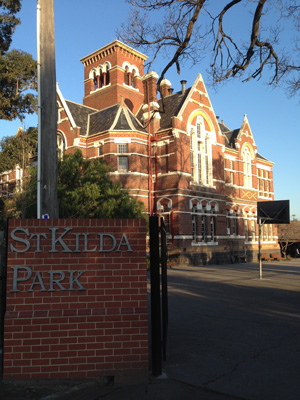
St Kilda Park Primary School.
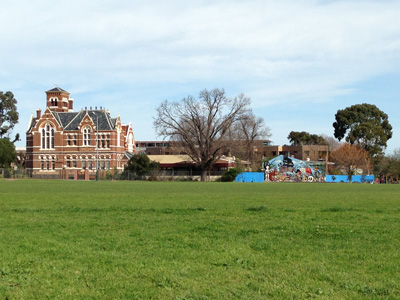
St Kilda Park Primary School.
There is also something mysterious about the heritage-listed walls of the main school building, something magical… I could of course go on.
Wizened colleagues had whispered in my ears upon my arrival some ten years ago, that “SKiPPS gets into your blood – you won’t ever want to leave!”
Of course it was only after I had left that I understood what they meant. Although I did leave, I continue to return because so much of who I have become as a teacher occurred within those great, magical walls!
A contributing factor to this greatness is the Italian language program.
Of course I sound biased, but I’m not at all concerned. I’m extremely proud of my teaching roots and feel that much of our success at SKiPPS needs to be shared and celebrated to inspire other teachers.
The school’s Italian Language program has been developing in effectiveness over these past few years. New teaching styles, access to new resources and a strengthening of staff-support have all been contributing factors.
But perhaps the most significant impact was that of our involvement in The About Taste Project; a unique sister school project which commenced in 2012.
This cultural and language project saw the involvement of eight primary schools on opposite sides of the world, working together to enhance the teaching and learning of languages; English and Italian.
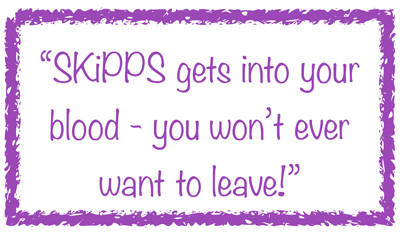
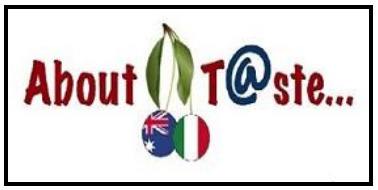
A network of passionate and dedicated language teachers and leaders was formed from four Victorian Primary Schools and from what became our four Sister Schools in Italy.
We shared the common aim of wanting to work in partnerships with other teachers, to enhance the efficacy of language teaching and learning for our students. We wanted language-learning to come alive for our students, for them to gain an understanding as to why they were learning the additional language.
Our plan to improve language education through authentic, everyday measures became a reality and before long, our students were conversing with their classmates on the other side of the world!
From classroom-to-classoom, we taught each other about the different cultural aspects of our countries; celebrations, music, sport, literature and so on. Our main focus was teaching each other about the food that we produce regionally (hence the ‘taste’ aspect of our project name).
An exciting and natural link was the theme of Expo Milano 2015; ‘Feeding the Planet, Energy for Life’ – at which we (staff and students) proudly presented our work! Whilst the teaching and learning of our countries’ food was the the core basis of our project, we discovered a multitude of additional learning along the way; for staff and students alike.
Our students made a positive step forward in becoming global citizens and we as teachers enhanced our teaching practices throughout this international project. It was excellent!
The conclusion of our journey to Expo didn’t signal the end of the concentrated focus of Italian at SKiPPS.
Rather, it increased engagement levels for students across the school and created mindsets such as; “I need to know how to speak Italian in case I’m chosen to go on the next Italian Study Tour…”
But not only for this reason. SKiPPS kids have a real understanding of the benefits for learning another language, they know that it assists with their overall learning. A recent return to my old stomping ground indicated that, much to my delight, SKiPPS is still very much full of ‘live Italian language!’
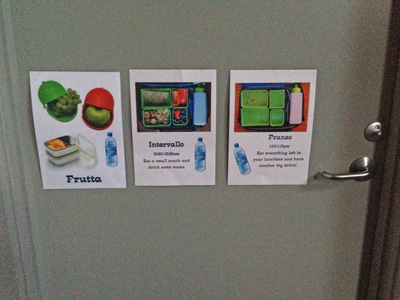
SKiPPS break-times.
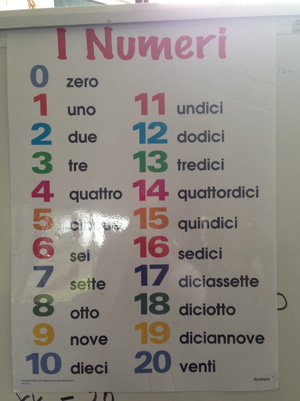
Italian numbers poster.
At SKiPPS, students and teachers not only greet each other in Italian, they ask with genuine interest about their wellbeing; (“Come stai, bene?” “Mmm, non ćè male grazie, e tu?”).
The morning roll-call is completed in Italian; the school-day is organised by the times of ‘Frutta,’ ‘Intervallo’ and ‘Pranzo’ (which everyone knows) and the Italian language is integrated across the curriculum.
In Maths classes, students can be seen counting items in Italian or classifying objects according to the Italian colours. It’s not a big deal if the classroom teacher doesn’t know the words – the kids do and they teach their teachers.
This is a beautiful example of what I came to define as ‘The Sideways Ladder’ approach to the teaching and learning of additional languages. In order to alleviate potential stress or anxiety for not knowing certain phrases or vocabulary, all members of the classroom work together on a levelled learning field – The Sideways Ladder.
Sharing knowledge and assisting each other as needed; no pressure. The specialist classes also incorporate Italian into their lessons as often as possible, with the teachers supporting each other with their planning.
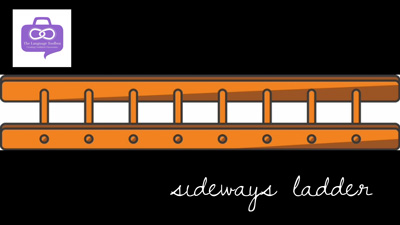
© The Language Toolbox.
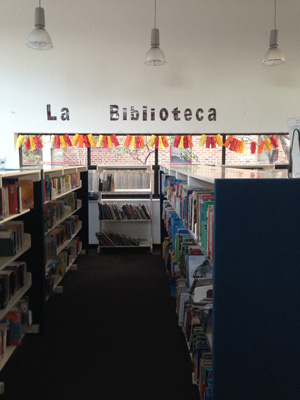
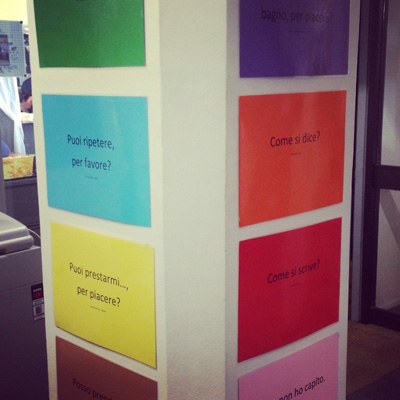
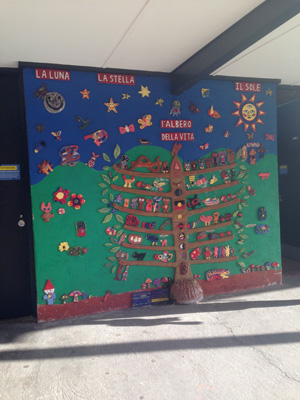
L-R: the school library; classroom displays of useful Italian phrases; Italian artwork completed by the students.

SKiPPS Kitchen-Garden program.
Then there’s the Kitchen-Garden Program. This is where the CLIL teaching and learning methodology really shines at SKiPPS!
As we know, a huge part of the Italian lifestyle and culture is related to food. And so, what better way to authentically teach the language than to design lessons and units relating to Italian cuisine!
The lucky students at SKiPPS first began attending Kitchen-Garden classes in 2014. The Year 3/4s were the first cohort to experience CLIL teaching and learning with the Tuscan Bean Soup experience.
Students learnt about the skill of procedural writing and used their knowledge to read and understand a recipe – in Italian – to then cook this in the kitchen!
Since then, Italian has become a feature aspect of the program thanks to the handwork and cooperation between the specialist teachers.CLIL cannot be taught in isolation – the very nature of CLIL teaching and learning requires teamwork. This is something that SKiPPS does well – team teaching.
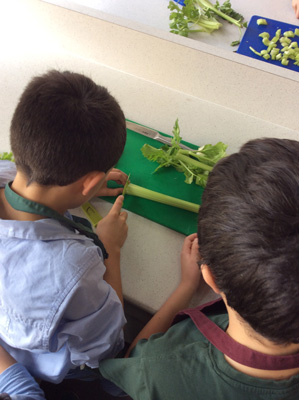
Hard at work in the SKiPPS Kitchen!

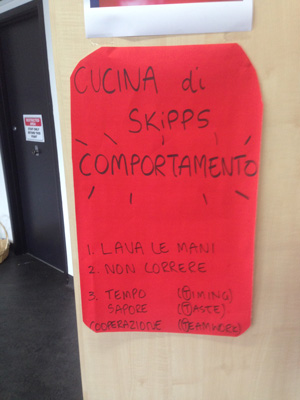
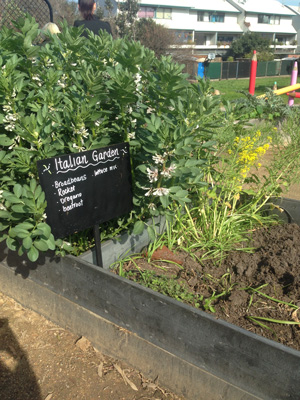
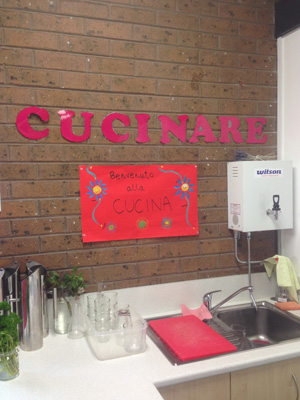
The SKiPPS Kitchen-Garden Program is popular amongst all members of the SKiPPS Community; students, teachers, parents, friends. A fabulously positive place to learn Italian!
So you see, Italian at SKiPPS is very much a whole-school approach. Little things make a big difference.
If you were to ask the staff at SKiPPS what they thought of their own Italian-language abilities, they would probably give a modest reply and instead turn the spotlight onto their students; “The kids are great, we work it out together.”
The SKiPPS kids are the stars here, shining as brightly as they do because of the guiding light provided to them by their dedicated teachers. And with such inspirational leaders, well, learning is bound to flourish. Well done St Kilda Park PS, you are a Stella School!
By Tilka Brown
©The Language Toolbox
For more information about St Kilda Park Primary School, please see their school website: http://www.skipps.vic.edu.au
